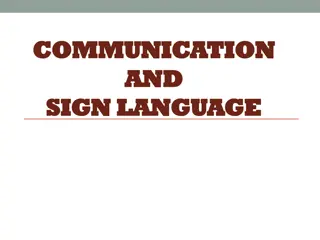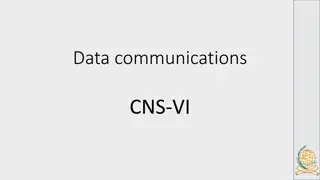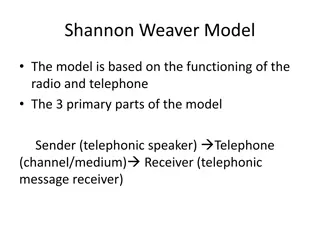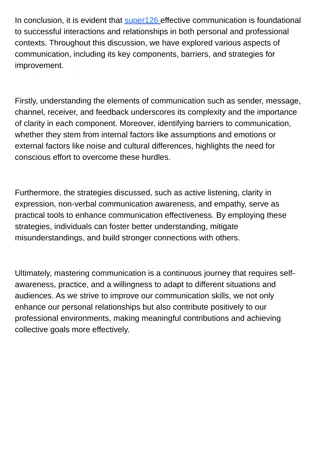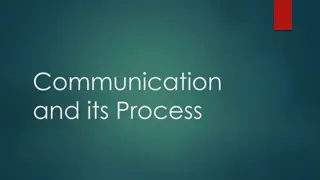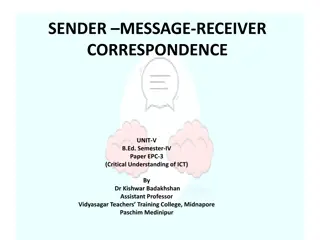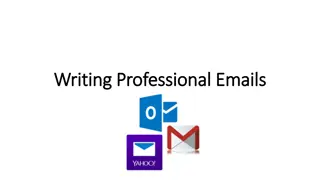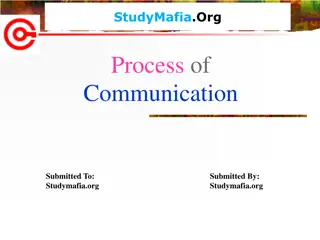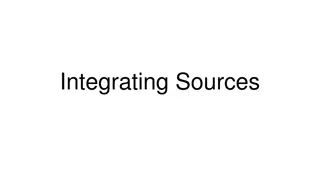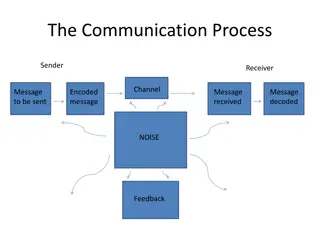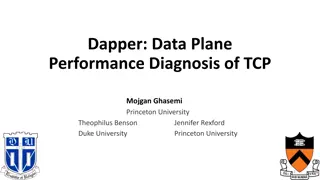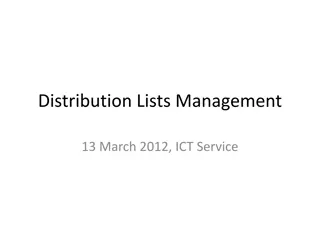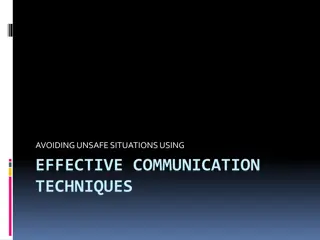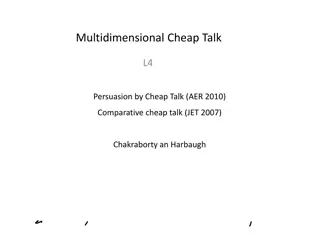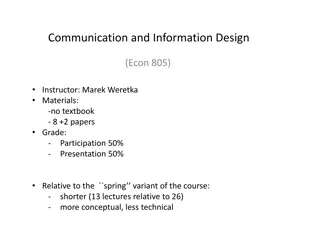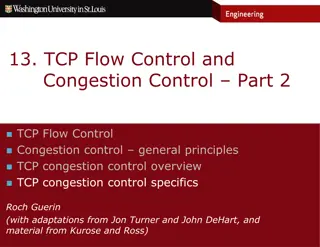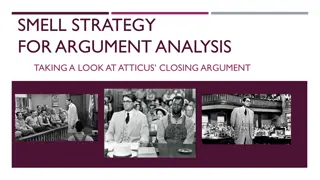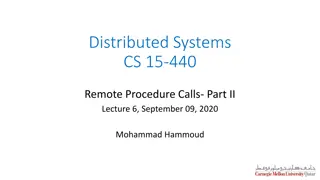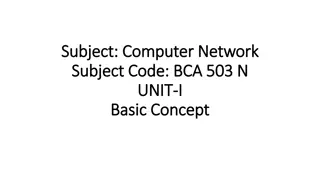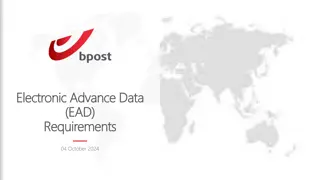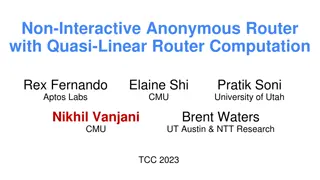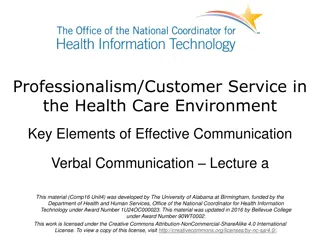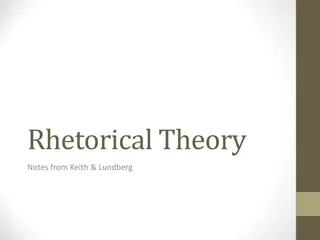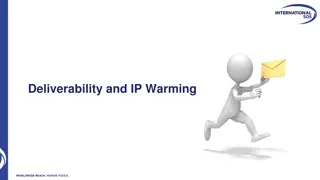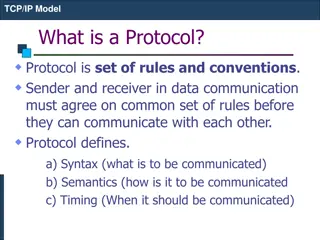Understanding Communication and Sign Language
Communication is the vital process of exchanging information, ideas, and emotions through various channels such as speech, signals, and writing. This includes verbal and non-verbal communication, where sign language plays a crucial role. Effective communication depends on the sender, message, channe
1 views • 31 slides
Fundamentals of Data Communications: Characteristics and Components
Data communications involve the exchange of data between devices through transmission mediums. The effectiveness of a data communications system relies on key characteristics like delivery, accuracy, timeliness, and jitter. The system components include the message, sender, receiver, transmission me
0 views • 63 slides
Communication Models Overview
The Shannon-Weaver Model is based on the functioning of radio and telephone, with key parts being sender, channel, and receiver. It involves steps like information source, transmitter, channel, receiver, and destination. The model faces technical, semantic, and effectiveness problems. The Linear Mod
0 views • 8 slides
super126
understanding the elements of communication such as sender, message, channel, receiver, and feedback underscores its complexity and the importance of clarity in each component. Moreover, identifying barriers to communication, whether they stem from i
6 views • 1 slides
Understanding the Communication Process: Steps and Importance
Communication is a vital process involving sender, message, medium, receiver, and feedback. It starts with ideation, followed by encoding, transmission, decoding, and feedback. Effective communication is key to establishing and maintaining relationships.
9 views • 10 slides
Understanding Sender, Message, Receiver Correspondence in Communication Process
Communication process involves sender, message, and receiver elements. The sender initiates communication, generates a message, and conveys it to the receiver. The message is encoded, transmitted through a channel, and decoded by the receiver. Noise can hinder the communication process by interferin
1 views • 13 slides
Mastering the Art of Writing Professional Emails
Understanding the key components of a formal email, such as sender, receiver, subject, message body, and salutations, is crucial for effective communication. Learn how to craft emails for various purposes and audiences to enhance your professional correspondence skills.
0 views • 24 slides
Understanding the Process of Communication
Communication is vital for both humans and organizations, involving the exchange of ideas, information, and feelings. This process entails a sender creating a message, encoding it, selecting a medium for transmission, and ultimately reaching the receiver with feedback loops. Effective communication
0 views • 17 slides
Understanding the Impact of Message Creation on Communication Processes
The process of communication begins with creating a message, which can significantly influence how it is received. Messages, conveyed through words, signs, or sounds, are interpreted by receivers based on the sender's delivery. Littlejohn (2018) emphasizes the importance of how senders initiate comm
1 views • 9 slides
Effective Communication Strategies in Business Environments
Explore the various aspects of communication processes within organizations, including sender-receiver dynamics, communication channels, small group networks, upward and downward communication methods, business communication tools, information richness of channels, email and voice mail etiquette, an
0 views • 21 slides
Evolutionary Dynamics in Signaling Games and Strategies
Explore the intricate dynamics of signaling games and evolutionary strategies like Lewis signaling games, Hamilton Maynard Smith theories, and replicator dynamics. Witness the evolution of signaling strategies through simulations and understand the role of replicator dynamics in population interacti
1 views • 50 slides
Active Response Mechanism for IaaS Cloud Security
Stepping-stone attacks in IaaS clouds pose a new threat where attackers compromise vulnerable VMs to launch attacks against external hosts. This research explores the necessity of self-protection mechanisms for IaaS providers, emphasizing active response to detect and stop outgoing attacks at edge f
0 views • 24 slides
TCP Data Plane Performance Diagnosis Research
Researchers from Princeton University and Duke University delve into diagnosing performance issues in TCP data planes within public clouds. They address challenges related to monitoring, identifying poor TCP performance sources, and diagnosing problems at the edge, proposing solutions for efficient
0 views • 20 slides
Guide to Managing Distribution Lists for Effective Communication
Learn how to effectively manage distribution lists for smooth communication flow. Understand different types of DLs, sender permissions, subscription processes, migration procedures, and contact details for support. Ensure better email communication within your organization.
0 views • 8 slides
Effective Communication Techniques for Avoiding Unsafe Situations
Recognize communication danger signs, prevent escalation, and communicate effectively in tense situations. Understand the basics of dynamic communication, sender-receiver dynamics, and instances where tensions arise. Prioritize safety by de-escalating agitated individuals, considering risk factors f
0 views • 31 slides
Insights into Persuasion and Equilibrium in Multidimensional Cheap Talk
Explore the dynamics of multidimensional cheap talk, focusing on sender-receiver interactions, influential equilibrium, welfare rankings, and fragility to asymmetries. Lessons touch on bubbling equilibrium, influential equilibrium issues, welfare rankings preferences, and the impact of asymmetric pr
0 views • 20 slides
Communication and Information Design Course Overview
This course, Econ.805, focuses on communication and information design principles with an emphasis on participation and presentations. The course covers essential topics such as importance of communication, strategies for effective communication, and applications in various fields. Students will exp
0 views • 12 slides
Understanding TCP Flow Control and Congestion Control Variants
The text delves into TCP flow control and congestion control mechanisms, focusing on TCP Tahoe and Reno variants. It explains the sender-side congestion control algorithms, such as AIMD, slow start, and fast recovery. Details of TCP variants like BIC and CUBIC are also discussed, highlighting their
0 views • 29 slides
Unveiling Persuasive Strategies in Atticus' Closing Argument
Explore the comprehensive analysis of persuasive strategies employed by Atticus in his closing argument, including ethos, pathos, logos, and linguistic devices. Delve into the intricacies of sender-receiver relationship, message content, emotional appeals, logical reasoning, and language choices.
0 views • 6 slides
Understanding Remote Procedure Calls in Distributed Systems
Explore the concept of Remote Procedure Calls (RPC) in distributed systems, including the basic RPC approach, middleware layers, transport primitives, failure types, and more. Learn how RPC enables communication between sender and receiver seamlessly, without direct message passing visible to the pr
0 views • 19 slides
Understanding the Layout of a Formal Letter
A formal letter is essential for professional communication, and understanding its layout is crucial. This includes the sender's address, date, salutation, subject, body of the letter, and complimentary close. Each component plays a significant role in conveying the message effectively and maintaini
2 views • 10 slides
Understanding Data Communication in Computer Networks
Data communication in computer networks involves the exchange of data between devices through various transmission mediums. The effectiveness of a data communications system relies on key characteristics like delivery, accuracy, timeliness, and jitter. Components of data communication include the me
0 views • 6 slides
Understanding Electronic Advance Data (EAD) Requirements for International Shipments
Electronic Advance Data (EAD) is vital for swift customs clearance and seamless international shipping. This set of information includes sender and addressee details, customs information like HS codes, and the country of origin. Compliance with EAD requirements ensures efficient customs processes, a
0 views • 12 slides
Non-Interactive Anonymous Router with Quasi-Linear Computation
Explore the concept of a Non-Interactive Anonymous Router with Quasi-Linear Computation, Receiver Insider Protection (RIP), Sender Insider Protection (SIP), and Multi-Client Functional Encryption. The comparison of anonymity notions in NIAR and the motivation behind the non-interactive anonymous shu
0 views • 29 slides
Effective Verbal Communication in Healthcare
This material explores the key elements of effective verbal communication in the healthcare environment, covering topics such as defining communication, identifying assumptions, communication models, variables, and the multidimensional nature of communication. It emphasizes the sender-receiver dynam
0 views • 25 slides
Creative Writing Activity: Crafting a Letter to the Farmer
Engage in a creative writing activity by imagining what Hefty Hugh and Lanky Len might express in a letter to the farmer after their attempted theft was foiled by a resilient ladybird. Explore letter writing skills, including starting with the recipient's name and ending with the sender's informatio
0 views • 5 slides
Understanding Rhetorical Theory: Key Concepts and Applications
Rhetorical theory explores the study of persuasive language and communication, tracing its origins from Plato to modern applications in shaping identity, power dynamics, and democracy. The theory delves into the importance of audience analysis, ethical considerations, and the interplay between messa
0 views • 14 slides
Understanding Deliverability and IP Warming in Email Marketing
Explore the concepts of deliverability and IP warming to improve your email marketing strategy. Learn about the importance of sender reputation, key factors affecting email delivery, and the methodology for warming up IP addresses. Discover how to establish a positive sender reputation and navigate
0 views • 15 slides
Understanding TCP/IP Protocol Suite
TCP/IP, a fundamental protocol suite, defines rules and conventions essential for data communication. It consists of layers like Network Access, Internet, and Host-to-Host, each serving specific functions. The suite ensures proper syntax, semantics, and timing for effective data exchange between sen
0 views • 53 slides
